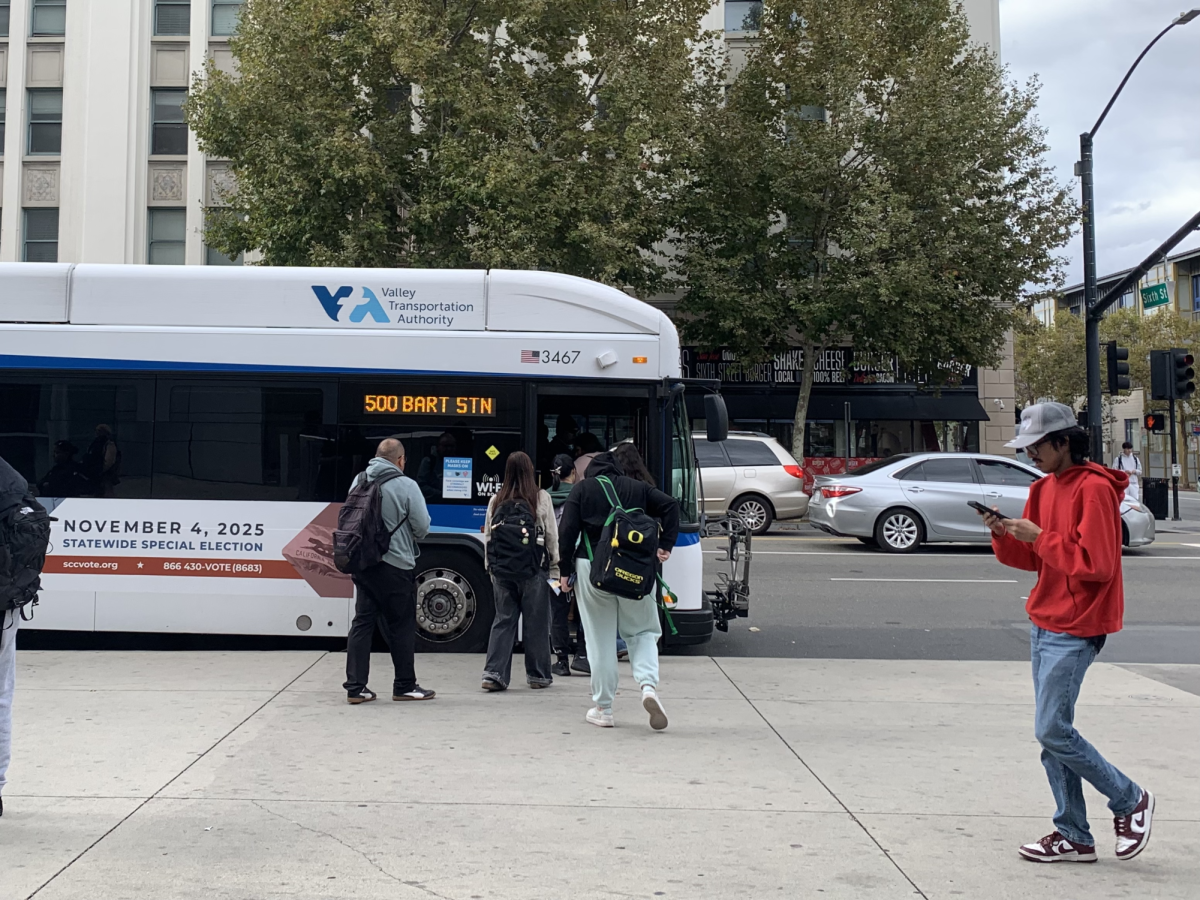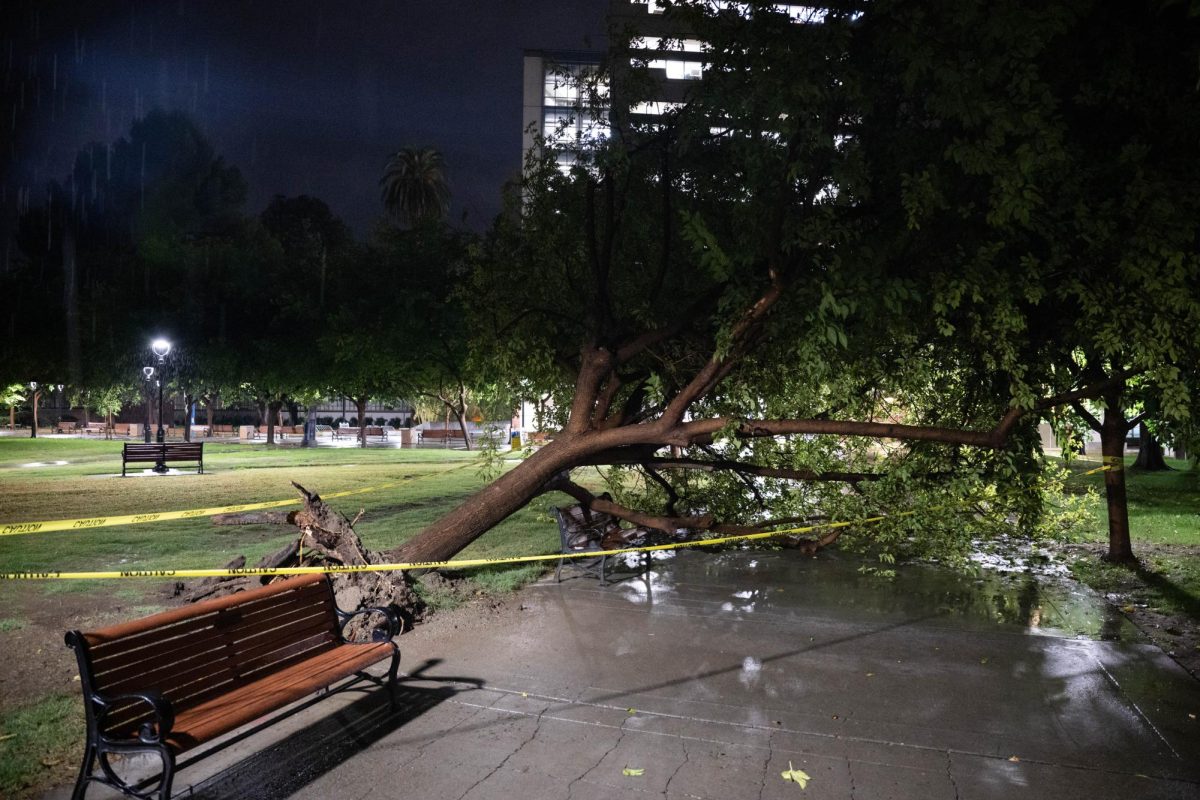More grants from the National Endowment for the Humanities continue to be terminated or not approved, but San José State and its faculty members are attempting to find other sources of funding.
The National Endowment for the Humanities is an independent federal agency that financially supports projects and research within the humanities throughout the United States, according to its website.
On April 2, Virginia Wright, the director of development for the Dr. Martin Luther King, Jr. Library and the College of Education at San José State, and her colleagues received a letter from the National Endowment for the Humanities stating that their grant had been terminated.
“It’s disheartening to say the least,” Wright said.
Wright and her colleagues run the Digital Humanities Center at the Dr. Martin Luther King, Jr. Library.
The center is a public lounge space for studying, socializing and community collaboration, according to its report. The space is also used as an exhibition area to showcase art and digital projects.
“It’s a center that gives students and faculty on campus, and the community digital tools to do projects that they wouldn’t normally have been able to do,” Wright said.
The Digital Humanities Center was supposed to be funded through public fundraisers and through a grant from the National Endowment for the Humanities, but the grant was terminated on April 2, according to a letter sent to its staff.
Changes in Grant Money Distribution on the Federal Level
Wright said their challenge grant was approved between 2019 and 2020, but was terminated by the National Endowment for the Humanities because their center no longer fits the agency’s priorities.
A challenge grant is when successful applicants fundraise and receive financial awards matching the cash contributions they raised through nonfederal third parties, according to a webpage from the National Endowment for the Humanities.
“(The National Endowment for the Humanities) has reasonable cause to terminate your grant in light of the fact that the NEH is repurposing its funding allocations in a new direction in furtherance of the President’s (Donald J. Trump) agenda,” the letter stated. “The President’s February 19, 2025 executive order mandates that the (the National Endowment for the Humanities) eliminate all non-statutorily required activities and functions.”
On Feb. 19, Trump’s administration announced that it would reduce the size of the federal government and “end ineffective government programs that empower government without achieving measurable results,” according to a fact sheet from the White House.
“We’ve met all our obligations. There was no reason to cancel it (the grant),” Wright said.
The scope: How many grants were cut?
Marc d’Alarcao, the interim vice president for research and innovation at SJSU, confirmed as of Monday that around 20 grants, or around $3 million in federal funds within the university, have been terminated by multiple federal agencies.
“I don’t know the magnitude yet of what we’re facing, but I think that it (the damage) could be very long lasting,” d’Alarcao said.
Around 1,435 grants or $427,666,781 have been terminated by the National Endowment for the Humanities, according to data from the Associations for Computers and the Humanities.
Roberto González, an anthropology professor, received two emails on Tuesday from the federal agency confirming that both of his grants were not approved.
“Any time you get turned down, it’s disappointing and frustrating – especially after you dedicate many hours to prepare a strong proposal,” Gonzalez said in an email sent to the Spartan Daily. “But at the same time, I wasn’t too surprised. After all, the current administration has made it very clear that many areas of research don’t align with its political agenda, and therefore aren’t worthy of funding.”
González applied for the Dangers and Opportunities of Technology: Perspectives from the Humanities program during the Fall 2024 semester.
According to the second email he received from the National Endowment for the Humanities, only 1 out of the 179 proposals for the grant was approved for funding.
“We are also very sorry to tell you that, as part of this shift in funding priorities, all of the programs from the Office of Digital Humanities, including future rounds of the Dangers and Opportunities of Technology program, have been cancelled,” the email stated.
On April 24, the National Endowment for the Humanities announced that the agency had taken several steps to improve its efficiency in its internal operations, including eliminating multiple offices, according to its webpage.
The federal agency has also been taking steps to ensure that all future awards are “merit-based (and) awarded to projects that do not promote extreme ideologies based upon race or gender,” according to the same source.
“I’ve been in higher ed (education) for more than 30 years now, and what’s happened over the past three months is unlike anything I’ve ever seen in my career,” González said in the email. “And I think it’s likely to get worse – at least in the short term.”
Finding additional funding
D’Alarcao said the university is taking multiple steps to compensate for the loss in funding.
He said this includes trying to raise public awareness, using university funds to bridge any gaps created by the grant cancellations and trying to find additional funding sources.
On Tuesday, the Digital Humanities Center published a press release asking for community members to send in donations after losing its funding from the National Endowment for the Humanities.
“We’re still determining the exact amount that we’re able to put aside for this,” d’Alarcao said. “We’re basically trying to take a little bit of money for existing programs and squirrel it away for the possibility of it (additional bridge funding).”
He said the university will not be able to fully compensate for all the funds lost and it will be up to individual researchers to find additional sources of funding for their projects.
Wright said the staff at the center spent five years fundraising $375,000 by reaching out to 97 donors.
She said the staff was supposed to receive another $375,000 from the National Endowment for the Humanities before their challenge grant was terminated.
Christina Mune, the associate dean of innovation and resource management at the Dr. Martin Luther King, Jr. Library and is a co-project director for the Digital Humanities Center, confirmed that the staff was only able to spend $70,000 of the grant on furniture before its termination.
“We were working on that final technology and installation and purchase, which was a big purchase,” Mune said. “Before we were able to spend the rest of the funds, the grant was canceled, and all unspent funds were taken back by (the National Endowment for the Humanities).”
Mune said the staff and additional staff at the SJSU Research Foundation applied for an appeal on May 1.
The SJSU Research Foundation supports faculty, staff and students in pursuing research, according to its webpage. This includes helping researchers plan projects, find funding sources, submit grant proposals and more.
In February, SJSU was recognized as a research institution for the first time and received a R2 research activity designation from the American Council on Education and the Carnegie Foundation, according to a Feb. 13 press release from SJSU.
“We’re appealing (the National Endowment for the Humanities) termination to see if we can get it reinstated or find out at least more information about why it was terminated,” Mune said.
In the meantime, Wright said she is reaching out to all 97 donors to confirm if they are still interested in funding the Digital Humanities Center and if they are open to donating more money.
“If they wanted to ask for the money back, we would give it back,” Wright said. “I’m sure that they’re not going to want it back, but we have to – in our due diligence – let them know that what we promised we can’t fulfill because of the changes.”
González said he is going to look for alternative funding sources during the Fall 2025 semester.
He said he will probably not depend on federal agencies and focus on private foundations.
“I’m also focused on strengthening my professional ties with colleagues who are based in Canada, Australia, Belgium, Norway, the UK and the Netherlands,” González said. “There is significant interest in my work in other countries, and I think in times like these it’s important for American researchers to have global networks.”






































